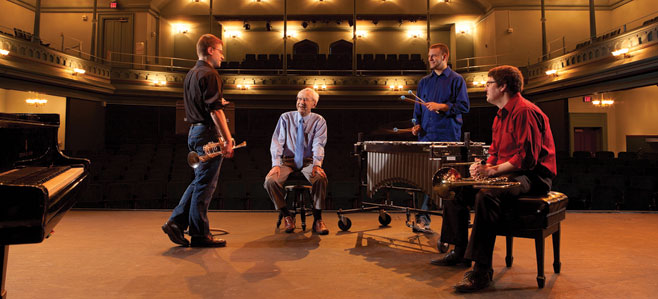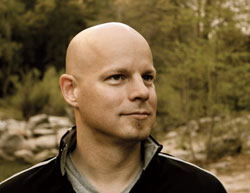
John Peterson, center, visited with music students Michael Romas (trumpet), Richard Schadt (percussion) and Joseph Greer (trombone) in the auditorium of Music Hall in May. Peterson, who established the John and Carolyn Peterson Jazz Professorship, died September 30, 2012.
Music often inspires people to dream big.
Young musicians playing big-band jazz at the Birch Creek Music Performance Center in Door County moved John Peterson to make a major investment in the University of Wisconsin-Madison School of Music.
“I knew nothing about the program at Birch Creek when a friend suggested we go to a concert,” said Peterson, emeritus professor of Communicative Disorders, in a July interview. He died September 30, 2012. “It was absolutely wonderful. Kids between 14 and 19 were performing, along with faculty from all over the country – the Eastman School of Music, Indiana University, all top-notch programs.
“Well, the students just blew me away,” Peterson said. “I thought, ‘If they can do this out here, why can’t we develop a program like this on campus at the School of Music?’”
Peterson supported many cultural endeavors in Madison and Wisconsin and established the John and Carolyn Peterson Jazz Professorship. Pianist-composer Johannes Wallmann, formerly director of jazz studies at California State University, East Bay, was hired from a field of more than 140 applicants and started this fall in the post.
In the competitive world of recruiting the best music students, the School of Music has many strengths, but it had lagged behind its peers in its jazz program.
“We’re missing a component as a major music educational institution in the United States of America, the home of jazz, if we don’t have a jazz program that is an integral part of the study options that students of all stripes can have here, music majors as well as non-music majors,” said John Stevens, director of the School. “We have had and continue to have very fine jazz musicians on our faculty. What this position allows us to do is really take a step to having a more comprehensive jazz program.
“This will be the first time we’ve had a faculty member whose entire job is devoted to jazz, as opposed to teaching bass like Richard Davis or teaching saxophone or composition like Les Thimmig,“ he said.
Building blocks in place
Wallmann comes to UW-Madison with a reputation as a world-class performer, composer, educator and consensus builder.
“There are a lot of things in place to build on,” he said shortly after arriving on campus. “We’re not starting from scratch. The big band, for instance, goes back to the 1970s.”
Wallmann’s first focus was examining the jazz offerings that already exist at the School.
“I think what allowed me to be really successful in my previous position, and what ultimately made me an attractive candidate here, is that
I’m very pragmatic in terms of having a larger vision of where we want to go and then looking year to year at what’s possible to take steps in that direction,” he said.

Before coming to UW-Madison, Johannes Wallmann was director of jazz studies at California State University, East Bay. Born in Germany, Wallmann spent much of his youth in Vancouver, Canada.
“The long-term goal is a jazz major as an option within the School that really prepares students for anything from becoming full-time, working, successful jazz musicians and composers to being music education majors who are going to teach the music and give them a solid foundation in the idiom of jazz, as well as the idiom of classical music.”
Wallmann was born in Münster, Germany, and moved to Canada’s Vancouver Island when he was 12 years old. “It rained eight months of the year in Vancouver, and I didn’t play the popular sports,” he said. “It’s hard to catch up to kids who have been playing hockey since they could walk. It’s kind of a boring place to be a teenager, so I focused on music.”
Later, while earning his PhD at New York University, Wallmann lived close to the legendary Village Vanguard. He took in a lot of live jazz at that club while writing his dissertation on Herbie Hancock, and he came to appreciate and write about the Thad Jones-Mel Lewis Orchestra, which in various incarnations has held a regular Monday night spot at the Vanguard for decades.
Wallmann has covered a broad scope in his composition and performance, from solo dates and his piano trio to more expansive arrangements for larger groups. His most recent CD, “The Coasts,” features the Johannes Wallmann Brasstet, which adds trumpet, trombone and tuba to his working trio.
Wallmann said he fell in love with Madison when he performed in the city 12 years ago, and he’s eager to work with student musicians of all backgrounds.
Value for all musicians
Jazz makes two vital contributions to a music program, Wallmann said. One is understanding the idiom. “It’s the classic American art form,” he said. The second is getting musicians who might not play jazz regularly familiar with how to approach the music. “Even for someone who doesn’t improvise, maybe this person might play some section charts in a big band for a while, and that player will get an understanding of phrasing and things like that,” he said.
Wallmann turned to an often-used analogy of jazz as a musical language, with its own grammar, syntax and vocabulary. “Whether somebody improvises within that or simply becomes conversant in that kind of language, understanding it when they’re hearing it or playing it is important,” he said, noting that quite a bit of 20th century and contemporary classical repertoire calls for improvisation.
“We improvise within the music using this language of jazz,” he said. “But it goes beyond that, taking musicians who really only ever perform music that is in front of them and giving them exposure to the freedom of saying, ‘It’s also OK for me to make up my own music.’ Composers benefit from that, and teachers benefit from that.”
School director Stevens echoed that point. “In 2012, the ability to play all styles and to have a comfort level with at the very least playing in traditional jazz and rock styles, in addition to newer, global styles, is important for everybody,” he said. “Even violinists who are going to be playing in symphony orchestras will be playing pops concerts, and they are going to benefit from exposure to a variety of experiences and styles.”
With a new School of Music Performance Center on the horizon – donors have pledged more than half of the estimated $46 million construction cost for the center to rise next to the Chazen Museum of Art – Stevens is hopeful that jazz will attract even more great musicians and be a growing part of the School’s more than 350 public performances presented each year.
Although John and Carolyn Peterson won’t be there to hear them, the sounds that will echo through those halls will be a lasting legacy for the couple, who gave so much to the arts at UW-Madison.
